 In each succeeding term the coefficient is found by multiplying the coefficient of the preceding term by the exponent of a in that term, and dividing by the number of the preceding term. In each succeeding term the coefficient is found by multiplying the coefficient of the preceding term by the exponent of a in that term, and dividing by the number of the preceding term.  The elements of algebra - Page 339by Andrew Bell (writer on mathematics.) - 1839Full view The elements of algebra - Page 339by Andrew Bell (writer on mathematics.) - 1839Full view - About this book
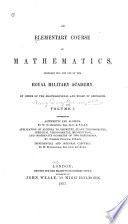 | Royal Military Academy, Woolwich - Mathematics - 1853 - 476 pages
...coefficients of the second term and the last but one are each the same as the index of the given power, and the coefficient of any term is found by multiplying the coefficient of the preceding term by the index of the power of the leading quantity in it, and dividing the product either by the number of... | |
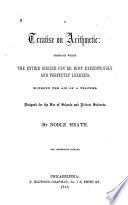 | Noble Heath - 1855 - 468 pages
...and divided by the number showing the number of terms preceding the fourth. Wherefore, in general, the coefficient of any term is found by multiplying the coefficient of the term preceding it, by the index of the leading quantity in that term, and dividing the product by the... | |
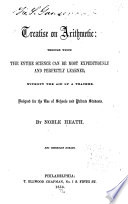 | Noble Heath - Arithmetic - 1856 - 472 pages
...and divided by the number showing the number of terms preceding the fourth. Wherefore, in general, the coefficient of any term is found by multiplying the coefficient of the term preceding it, by the index of the leading quantity in that term, and dividing the product by the... | |
 | Charles Davies - Algebra - 1860 - 332 pages
...2. LAW OF COEFFICIENTS. The coefficient of the first term is 1 / the coefficient of any succeeding term is found by multiplying the coefficient of the preceding term by the exponent of tJie leading letter in that term, and dividing the product by the number of terms preceding the required... | |
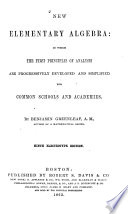 | Benjamin Greenleaf - 1863 - 338 pages
...first term is one; that of the second term is the same as the exponent of the power ; and, in general, the coefficient of any term is found by multiplying...the preceding term by the exponent of the leading letter of the same term, and dividing the product by the number which marks its place. NOTE 1. When... | |
 | Horatio Nelson Robinson - Algebra - 1866 - 328 pages
...coefficient of the leading quantity in the root. UNIVERSALLY; — The coefficient of any term may be obtained by multiplying the coefficient of the preceding term...the exponent of the leading quantity in that term, or by (he number of the term from the last, and, by the coefficient of the following quantity in the... | |
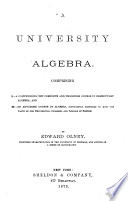 | Edward Olney - Algebra - 1873 - 354 pages
...expansion is unity ; of the second, the exponent of the required power ; and that of any other term may be found by multiplying the coefficient of the preceding term by the exponent of the first letter in that term, and dividing the product by the exponent of the second letter + 1. 100,... | |
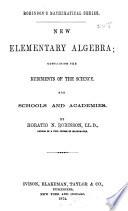 | Horatio Nelson Robinson - Algebra - 1874 - 340 pages
...coefficient of the leading quantity in the root. UNIVERSALLY; — The coefficient of any term may be obtained by multiplying the coefficient of the preceding term...the exponent of the leading quantity in that term, or by the number of the term from the last, and by the coefficient of the following quantity in the... | |
 | Horatio Nelson Robinson - Algebra - 1875 - 340 pages
...the leading quantity in the root. UNIVERSALLY : — The coefficient of any term may bе obtained Ъу multiplying the coefficient of the preceding term...the exponent of the leading quantity in that term, or by the number of the term from the last, and by the coefficient of the following qnantity in the... | |
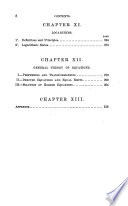 | William Guy Peck - Algebra - 1875 - 348 pages
...LAW OF COEFFICIENTS. — The coefficient of the first term is 1 ; the coefficient of any succeeding term is found by multiplying the coefficient of the preceding term by the exponent of the leading letter in that term, and dividing the product by the number of terms preceding the required term. Let... | |
| |